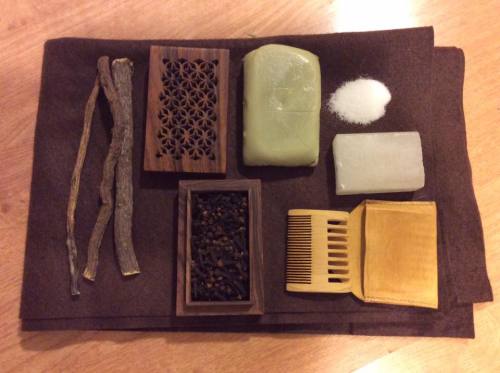1523 posts
Posted By Steven Payne To Facebook Group British Medieval History:

Posted by Steven Payne to Facebook group British Medieval History:
People in the Middle Ages valued sweet smelling breath and bodies, seeing them as desirable, so there is a great deal of evidence from the period of tooth pastes, powders and deodorants. Contrary to the typical Hollywood depiction of medieval peasants with blackened and rotting teeth, the average person had teeth which were in fairly good condition, mainly due to the rarity of sugar in the diet. Most medieval people could not afford sugar and those who could used it sparingly. Archaeological data shows that only 20% of teeth had signs of decay, as opposed to 90% in the early twentieth century. The main dental problem for medieval people was not decay but wear, due to a high content of grit in the main staple, bread. For deodorants, soap was available for the wealthy, but a variety of herbs and other preparations were also used. Soapwort is a plant native to Europe and Asia which, when soaked in water, produces an effective liquid soap. Mint, cloves and thyme were also extensively used by simply rubbing into the skin, and alum (hydrated potassium aluminium sulphate) was an effective deodorant. I am trying to keep to 14th century technology on my pilgrimage to Canterbury, which gives me various options when looking at hygiene. In the middle ages people generally cleaned their teeth by rubbing them and their gums with a rough linen cloth, or the chewed end of a stick. There are various recipes for pastes and powders that could be put on the cloth to help clean the teeth, but I have chosen simple salt to whiten them and to aid fresh breath. I will also be using the stick method, and will be taking along a supply of liquorice root sticks for that purpose. I also have a few blocks of alum, which when rubbed into wet skin has a deodorising effect. Alum, like beeswax, was used extensively in the middle ages for a variety of purposes, also being useful: * in the purification of drinking water as a flocculant * as a styptic to stop bleeding from minor cuts * as a pickling agent to help keep pickles crisp * as a flame retardant * as an ingredient in modelling clay * as an ingredient in cosmetics and skin whiteners * as an ingredient in some brands of toothpaste The photograph shows my wash kit including home made olive oil soap, salt for the teeth, a block of deodorising alum, cloves, a boxwood comb made for me by Peter Crossman of Crossman Crafts and some liquorice root sticks, all on a woollen ‘towel’. Note that the cloves are kept in a ventilated box….this is because insects hate the smell of cloves and so a perforated box will keep them out of my kit and food bag when I am sleeping rough. TIP: If you steep some cloves to obtain the oil and put the liquid around the doors and windows of your house, it keeps spiders and insects out.
-
 writebystarlight liked this · 10 months ago
writebystarlight liked this · 10 months ago -
 king-schott liked this · 10 months ago
king-schott liked this · 10 months ago -
 fangirltrash liked this · 10 months ago
fangirltrash liked this · 10 months ago -
 fangirltrash reblogged this · 10 months ago
fangirltrash reblogged this · 10 months ago -
 catboyrescue reblogged this · 11 months ago
catboyrescue reblogged this · 11 months ago -
 albertxylin liked this · 11 months ago
albertxylin liked this · 11 months ago -
 redrum-sketches liked this · 11 months ago
redrum-sketches liked this · 11 months ago -
 artsyfartsy-lemontartsy reblogged this · 11 months ago
artsyfartsy-lemontartsy reblogged this · 11 months ago -
 timeywimeydemigod liked this · 11 months ago
timeywimeydemigod liked this · 11 months ago -
 vgvikdal reblogged this · 11 months ago
vgvikdal reblogged this · 11 months ago -
 wiccanginger liked this · 11 months ago
wiccanginger liked this · 11 months ago -
 ethantherenegade liked this · 11 months ago
ethantherenegade liked this · 11 months ago -
 ethantherenegade reblogged this · 11 months ago
ethantherenegade reblogged this · 11 months ago -
 beetleboo reblogged this · 11 months ago
beetleboo reblogged this · 11 months ago -
 sleepingbirch liked this · 11 months ago
sleepingbirch liked this · 11 months ago -
 the-bibliophage221b reblogged this · 11 months ago
the-bibliophage221b reblogged this · 11 months ago -
 raymondshields reblogged this · 11 months ago
raymondshields reblogged this · 11 months ago -
 josaprcat liked this · 11 months ago
josaprcat liked this · 11 months ago -
 alphabatet reblogged this · 11 months ago
alphabatet reblogged this · 11 months ago -
 feaheart reblogged this · 11 months ago
feaheart reblogged this · 11 months ago -
 feaheart liked this · 11 months ago
feaheart liked this · 11 months ago -
 tasha-stasha reblogged this · 11 months ago
tasha-stasha reblogged this · 11 months ago -
 holminster-bitch reblogged this · 11 months ago
holminster-bitch reblogged this · 11 months ago -
 iamjustgod liked this · 11 months ago
iamjustgod liked this · 11 months ago -
 aladycalledkatie reblogged this · 11 months ago
aladycalledkatie reblogged this · 11 months ago -
 ghostqueefs liked this · 11 months ago
ghostqueefs liked this · 11 months ago -
 actuallyabogbody liked this · 11 months ago
actuallyabogbody liked this · 11 months ago -
 mitlicrbre reblogged this · 11 months ago
mitlicrbre reblogged this · 11 months ago -
 mitlicrbre liked this · 11 months ago
mitlicrbre liked this · 11 months ago -
 papa-poutine liked this · 11 months ago
papa-poutine liked this · 11 months ago -
 inaworldsodark liked this · 11 months ago
inaworldsodark liked this · 11 months ago -
 dimir-charmer reblogged this · 11 months ago
dimir-charmer reblogged this · 11 months ago -
 too-fond-to-be-fearful liked this · 11 months ago
too-fond-to-be-fearful liked this · 11 months ago -
 ofrabjousnight liked this · 11 months ago
ofrabjousnight liked this · 11 months ago -
 lesbian-mulder liked this · 11 months ago
lesbian-mulder liked this · 11 months ago -
 bookwormwinnetou liked this · 11 months ago
bookwormwinnetou liked this · 11 months ago -
 blysse-and-blunder reblogged this · 11 months ago
blysse-and-blunder reblogged this · 11 months ago -
 helpmekissthiswasp liked this · 11 months ago
helpmekissthiswasp liked this · 11 months ago -
 arbitraryexistence reblogged this · 11 months ago
arbitraryexistence reblogged this · 11 months ago -
 madynacht reblogged this · 11 months ago
madynacht reblogged this · 11 months ago -
 birdthatisbored liked this · 11 months ago
birdthatisbored liked this · 11 months ago -
 dirtposts reblogged this · 11 months ago
dirtposts reblogged this · 11 months ago -
 ghosttappp liked this · 11 months ago
ghosttappp liked this · 11 months ago -
 capt-ishmael reblogged this · 11 months ago
capt-ishmael reblogged this · 11 months ago -
 maliceandarrogance reblogged this · 11 months ago
maliceandarrogance reblogged this · 11 months ago -
 maliceandarrogance liked this · 11 months ago
maliceandarrogance liked this · 11 months ago -
 lobsterfork liked this · 11 months ago
lobsterfork liked this · 11 months ago -
 morgan-the-lonely-brick reblogged this · 11 months ago
morgan-the-lonely-brick reblogged this · 11 months ago -
 morgan-the-lonely-brick liked this · 11 months ago
morgan-the-lonely-brick liked this · 11 months ago
More Posts from Any-mouse
every girl wants to get in a vehicle and flip 3-6 switches overhead in the process of turning it on
fun fact about languages: a linguist who was studying aboriginal languages of Australia finally managed to track down a native speaker of the Mbabaram language in the 60s for his research. they talked a bit and he started by asking for the Mbabaram word for basic nouns. They went back and forth before he asked for the word for “dog” The man replied “dog” They had a bit of a “who’s on first” moment before realizing that, by complete coincidence, Mbabaram and English both have the exact same word for dog.
This is why the artists latched onto the Bob Ross Tree Method.




Wow. Talk about attention to detail.
Video here: https://twitter.com/javi_draws/status/965260617790738432?s=21
I'm really tired of the "woman sad about her arranged marriage" trope, especially if that woman is royalty.
I am sure that many women across time were sad about their arranged marriages, but I'm sure a lot of others were excited, ambivalent, or resigned. Again, especially if you were royalty! I am sure if you were born a princess, you were trained from birth that your whole purpose in life was to marry someone important to solidify the power of the person on the throne. And honestly, it's an important job, if it wasn't, they wouldn't have tried so hard to do it.
That woman isn't just marrying another king or prince, she's going to be an ambassador of her country. She's supposed to be there promoting good relations. She isn't just a woman being sold off, she has a job! Also, if she is marrying the reigning monarch (or the heir), she may well end up running the country if the king is off at war or he dies when the heir is really young. That happened a lot throughout history! (or maybe she marries the third son and helps him find his way to the throne. Good for her)
It just feels like a modern sentiment being projected back. In Romeo and Juliet, when Juliet's mother first brings up marrying her to Paris, Juliet's basically cool with it and says she'll try to like him. She would have known this was going to happen because that is what rich women do, they marry into another family so their two families can be buddies. What else would she even be expecting?
It wouldn't bother me so much except that it's all we see! Give me a story about a woman who is like, "Cool, I shall give it my all!" Or she's like rolling up her sleeves and planning how she's going to get the court on her side and rule France, power behind the throne style (these women are mostly portrayed as villains, but who is to say the king would do a better job?). And also, have a little faith in women's fathers? You think men in the past didn't occasionally consider the happiness of their daughters? Not even a little bit?